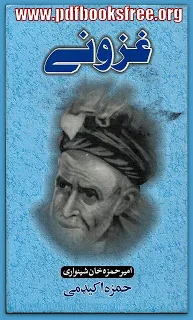
Ghazawane Pashto Poetry Book By Amir Hamza Baba Free Download in Pdf
Ghazawane is a book of Pashto classical Poetry Amir Hamza Khan Shinwari Sahib, contains handsome collection of Pashto romantic classic ghazals and poems in Pdf format.
Amir Hamza Shinwari, one of the legendary Pashto poets, script writers and dramatists, is often referred to as ‘Baba-e-Ghazal’ (the father of Pashto Ghazal). Hamza Baba was born in Lwagi a village of the rugged mountains of the Khyber agency near Peshawar. He opened his eyes in the house of Malik Baz Mir Khan, Chief of the Ashraf Khel, a kin group of the Shinwari Pathan tribe, in December 1907. At the age of six years, he was admitted to Government High School in Lwargi; from there, once he was eight, he came to Peshawar and continued his education at Islamia Collegiate School. Once he was in ninth class, he came to his village and got married soon after, as per the Shinwari tradition of early weddings.
Hamza Baba later joined the British Government service as a Passport Officer and worked as a T.T. Officer within the Railways department. Forced by his restless nature, he quit his duty and devoted his energies to shining and glossing over the inborn creator.
He visited the cosmopolitan town of Bombay, the Bollywood in India. There he performed as a thief in a very silent film named ‘Falcon’: however unhappy with it, he came back to his country. He devoted his life to mysticism, below the patronage and steerage of his Murshid (godfather), sheikh Abdul Satar Chesthi, referred to as ‘Bacha Khan’. Impressed by the wonderland of mysticism (Sufism), he is known as the ‘haratabad, and he needs to attain the impossible. He graven a distinct segment within the awful of temple mysticism and lived there permanently within the cloister of his soul.
Hamza Shinwari started his career as a poet when he was in 5th class. According to Hamza Baba, “My poetic nature persuaded me, and I started poetry in Urdu.” The first poetry of his life was in Urdu. But on the advice of his patron, Sheikh Abdul Satar, he started poetry in his mother tongue and devoted himself to the service of Pashto.
Amir Hamza Baba was an author and prose writer of his category. He wrote additional or less than four hundred dramas. In keeping with Hamza Baba, he has written two hundred plays throughout his lifelong association with the All-India Radio, which was established in 1935. a number of his well-known plays are Zamindar, Ahmad Shah Abdali, Akhtar Mo Mobarak Shah, Dwa Bakhilan, Fateh Khan Rabia, Guman DA Eman Zyan, Khan Bahadur, Khushal Khan Khattak, Khisto, Matali Shair, Maimona, Muqabilla, Qurbani, Spinsare Paighla, Da Damano Khar, Da Chursiyano Badshah and Jrandagarhe. However, these square measures simply have names and no additional, as most of those manuscripts, for which he two-handed over to the Radio in the original text, were lost or misplaced. He wrote the scripts, songs and dialogues of 3 mega-hit classical, namely: Laila Majnoon, Paighla (the Virgin) and Allaqa Ghair, each in 1960.
Hamza Baba has authored so many books on varied subjects: some about the philosophy of human life and mysticism, others about love and romanticism, or ethics and social values. Starting with short stories and essays, to some estimates, he has 30 books to his name, including ten books in Urdu. These include Tazkira-e-Sittaria, Tajjaliate Mohammadia (the refulgence of Mohammad), Jabar Wa Ikhtiaar (Free will & Predetermination), Nawe Chape (new waves), Tashheer da Kaiynat (conquest of the universe), Wajud Wa Sujud (the essence of the apparent), Anna aur Ilm (ego and knowledge) in Urdu and its Pashto version, Insany anna au poha (human ego and knowledge), Zhwand (life) in Pashto and Zindagee in Urdu, and Da Weeno jam (cup of blood). He has written a travelogue of his journey to Afghanistan and Mecca.
He translated Rehman Baba’s Dewan (poetry collection) into Urdu and two major works —Dr. Allama Mohammad Iqbal’s Armaghan-e-Hijaz and Javed Nama —into Pashto in 1964 and 1967, respectively.
This book, Ghazawane, contains a huge collection of Pashto traditional, social, and romantic ghazals, poems, rubaiyat, charbetha and other folk songs. The book is in PDF format; anyone can read it online or download it from the links below for free.
